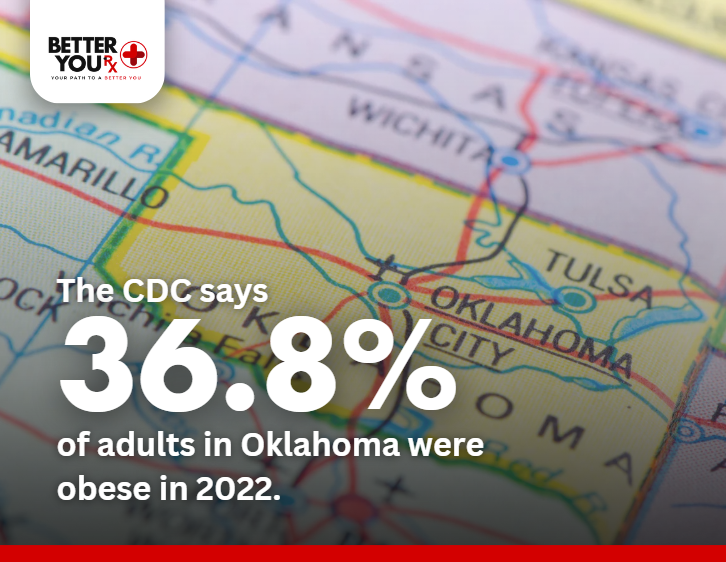Oklahoma’s 2024 Obesity Challenges and Effective Solutions
Oklahoma, like much of the United States, is facing a growing obesity epidemic. This issue harms individuals’ health and well-being. It also burdens the healthcare system and the economy. This article will explore the causes of obesity in Oklahoma. It will cover its health effects, current efforts to fight it, and practical solutions. This guide is for you, whether you’re a citizen, a healthcare provider, or a policymaker. It offers insights and actions to help address obesity in Oklahoma.
Understanding the Obesity Problem in Oklahoma’

Prevalence and Statistics
Oklahoma has some of the highest obesity rates in the country. The CDC says 36.8% of adults in Oklahoma were obese in 2022. This is much higher than the national average of 31.9%. Over one in three Oklahomans are struggling with obesity. This raises their risk of many health problems.
The issue is not limited to adults; childhood obesity is also a critical concern. Nearly 20% of Oklahoma children aged 10-17 are obese, ranking the state as one of the highest in the country. These stats highlight the urgent need for strategies to combat obesity in all age groups.
Contributing Factors
To understand Oklahoma’s obesity, we must examine some key factors.
- Dietary Habits: Fast food and junk food are popular in Oklahoma. Many rural communities face “food deserts.” They have limited access to fresh, healthy food. So, residents often rely on convenience stores and fast food. They have few healthy options.
- Physical Activity: A sedentary lifestyle is another significant contributor to obesity. Many Oklahomans have few chances for exercise. This is true in areas without parks or safe walking paths. Schools, too, have cut physical education. This has lowered children’s activity levels.
- Socioeconomic Factors: Poverty and obesity are closely linked. In Oklahoma, nearly 15% of the population lives in poverty. This often leads to higher obesity rates. Low-income families may struggle to afford healthy food or gym memberships. This may worsen obesity.
- Cultural Influences: Southern and Midwestern diets are high in fat, sugar, and calories. They are traditional. They contribute to obesity. Cultural norms around food, like large portions and fried foods, also play a role.
Health Impacts of Obesity in Oklahoma
Chronic Diseases
Obesity causes many chronic diseases. The state possesses one of the highest diabetes rates in the nation. Thirteen percent of adults receive a diagnosis of the condition. Obesity harms lives and raises healthcare costs, straining resources.
Mental Health
The impact of obesity extends beyond physical health. Strong associations link obesity to depression and anxiety. Obesity brings social stigma and discrimination. It harms self-esteem and mental health. This can create a cycle. Mental health issues cause more weight gain.
Economic Impact
The economic consequences of obesity in Oklahoma are significant. Healthcare costs tied to obesity total billions every year. They account for a large portion of the state’s healthcare spending. Also, obesity can reduce workforce productivity. Employees may need more sick days or be less effective at work due to health issues.
Current Efforts and Initiatives
Government Programs
Oklahoma, aware of the obesity epidemic, has taken steps to reduce obesity. Programs, like the Oklahoma Health Improvement Plan (OHIP), aim to boost nutrition and fitness. They also seek to expand access to healthcare. The state has launched campaigns to raise awareness of healthy living. They aim to encourage Oklahomans to adopt healthier lifestyles.
For example, the Shape Your Future campaign promotes healthy eating and active living. It does this through educational resources, community events, and local partnerships. These initiatives have shown promise. Much work is left to slash obesity rates and make it last.
Community-Based Programs
Local communities across Oklahoma are also playing a critical role in combating obesity. Community-based programs that focus on grassroots efforts to promote healthy living are crucial. They can reach people without access to state-level resources.
The Oklahoma Fit Kids Coalition supports healthy choices for kids and families.
These efforts include community gardens, improved school nutrition programs, and safe, accessible spots for exercise. These programs are fighting obesity. They engage locals and foster community ownership.
Proposed Solutions
Improving Dietary Habits
One of the most effective ways to combat obesity is by improving dietary habits. This can be achieved through:
- Access to Healthy Foods: We must ensure all Oklahomans can get cheap, healthy food. It’s vital. We can do this by backing farmers’ markets and community gardens. Also, we should support grocery stores in underserved areas. Schools and workplaces can help. They should offer healthier food in cafeterias and vending machines.

- Nutrition Education: Nutrition and healthy eating are vital. They help people make informed food choices. Cooking, meal planning, and balanced diet programs can empower people. They can take control of their health.
Increasing Physical Activity
Encouraging more physical activity is another key strategy in reducing obesity. Potential solutions include:
- Investing in parks and trails can help people be active. So, we should develop public recreational spaces. Communities should consider “Complete Streets.” Designers have made them safer and more accessible for pedestrians and cyclists.
- Promote Physical Activity in Schools and Workplaces: Schools should focus on PE. They should provide opportunities for students to be active all day. Employers can promote physical activity. They can offer wellness programs, gym memberships, or rewards for active commuting.
*
Policy Recommendations
To support these efforts, policymakers should consider the following recommendations:
- Regulating Food Marketing and Labeling: We should limit marketing unhealthy foods to children. It can help reduce obesity. Clear and accurate food labeling can also help consumers make healthier choices.
- Supporting Public Health Campaigns: We must keep funding campaigns that promote healthy living. They are vital. Campaigns resonate with Oklahoma’s diverse cultures and focus on community needs.
Healthcare Interventions
Healthcare providers play a critical role in managing and preventing obesity. Solutions include:
- Weight Management Programs: Offering programs can help with weight management. They should include dietary counseling, activity guidance, and behavioral therapy.
- Access to Healthcare Services: All Oklahomans must get obesity care. Telehealth services can be a good way to reach rural or underserved areas.
How Individuals Can Take Action
Personal Health Strategies
We need systemic changes to tackle obesity. But individuals can also take steps to improve their health.
Nourish your body with nature’s bounty. Fill your plate with colorful produce, hearty grains, and lean proteins. Skip the packaged junk and sugary drinks. Watch how much you eat. Your health will thank you.
Regular Physical Activity: Aim for 150 minutes of moderate aerobic activity each week. Twice weekly, incorporate strength training to complement your routine. Choose enjoyable activities, like walking, swimming, or dancing. Do them often to make exercise a habit.
Community Engagement
Individuals can help fight obesity by getting involved in their communities.
- Support Local Initiatives: Volunteer with local groups that promote health. These include community gardens and fitness programs. Your involvement can help create a healthier environment for everyone.
- Advocate for Policy Changes: Support policies that boost public health. This includes better school nutrition and more access to parks and gyms. Your advocacy can help drive the systemic changes needed to combat obesity.
Conclusion
Oklahoma’s obesity problem is complex. It needs a broad solution. If we know the causes of obesity and its health effects, we can work for a healthier future for all Oklahomans. We must also find and use effective solutions at the community and individual levels.
For those with obesity, medication can help with weight loss. Wegovy (Semaglutide) is an approved drug.

It helps people lose weight and live healthier. At Better You Rx, we offer Wegovy. It’s part of our mission to provide effective, affordable healthcare. Visit our website to learn more about Wegovy and how it can support your weight loss journey

